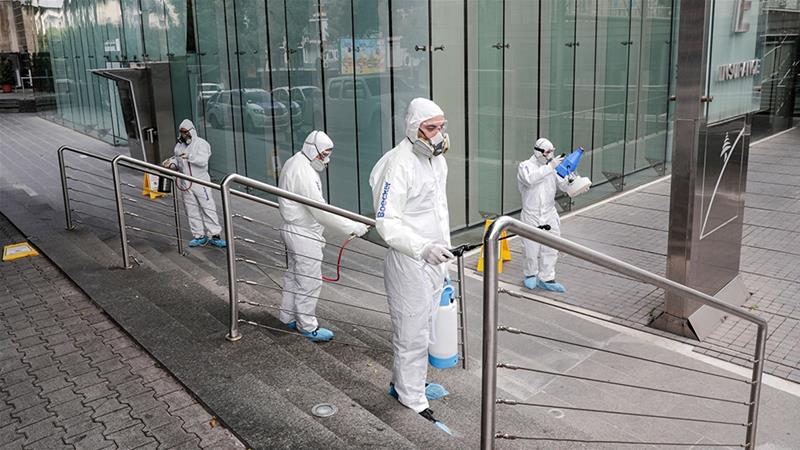Health Minister Hamad Hasan said on Sunday that lockdown measures will be revisited after May 10, when the Lebanese cabinet will be able to determine how long the coronavirus confinement will presumably last.
The country has so far curbed a wide scale outbreak by implementing early lockdown, curfew, and general mobilization rules. Cases during the past week have reached significant lows, with only one new case announced on Sunday, but the results are not conclusive enough to alter the set measures. Today, four new cases have been announced –putting the total at 677 COVID-19 cases recorded in Lebanon.
Mass public testing is the only way to mine data for such a decision. The health minister announced that testing will go from 1,000 to 1,500 per day, but public health experts have warned that at least 2,500 tests per day need to be randomly conducted for more accurate results.
For the present time, the only measure that has been amended is the shortening of the public nighttime curfew by one hour as a result of the recent drop in new COVID-19 cases. The curfew, which previously started at 7 pm, is now set between 8 pm and 5 am according to a memo issued by Interior Minister Mohammed Fahmi.
Essential service providers, such as supermarkets, bakeries, and restaurant delivery services, are exempt from the lockdown procedures.
Countries across the globe have begun to ease lockdown measures, with Denmark even deciding to reopen schools. Resuming normal life, however, may not be a viable option in Lebanon. Easing lockdown measures does not mean the country is no longer subject to another outbreak of the virus.
If measures are to be eased or lifted, the consequences may cause a resurgence of COVID-19 cases and threaten the foundation of the Lebanese healthcare system. While the immediate danger has been curbed, second and third waves of patients are still incredibly likely.
Hong Kong, Singapore, and Taiwan all controlled the initial wave of coronavirus cases through mass testing and some social restrictions. A resurgence of COVID-19 cases, however, has now led them to implementing stricter lockdown measures.
Nurses, doctors, and volunteers in Lebanon are standing together to combat the novel coronavirus, but the healthcare sector remains massively under-equipped to handle a mass outbreak.
Lebanon’s lockdown measures should unwind gradually, “based on trial and error, and will hinge on citizen cooperation,” health experts told the Daily Star.
The Rafik Hariri University Hospital, home to almost 50 percent of those infected, stated that it is currently only capable of housing 150 patients with moderate symptoms and 22 critical cases. In the event of a mass outbreak, these numbers are significantly low for a country that is home to six million individuals.
A preventative vaccine for the virus has still not been manufactured, with scientists worldwide frantically searching for the cure. Until then, hospitals can only treat the patients to the best of their abilities.
Firass Abiad, head of Rafik Hariri University Hospital, stated that the reasons Lebanon has been able to curb an outbreak thus far is due to the early lockdown and the growing fear that drove people to abide by social distancing guidelines. According to Abiad, these two factors “will have to be reversed” if the country is to ease lockdown measures.
With the looming economic collapse, individuals are becoming restless on when they will be allowed to return to work. Just last week, protestors took to Al Nour square in Tripoli to protest against the situation and devaluation of the Lira.
Easing the lockdown alone is not enough. To reach full economic activity, people have to feel safe as they go outside. #Covid19 will be there. Safe return to work requires meticulous planning by the authorities. It also requires responsible collective and individual behavior.
— Firass Abiad (@firassabiad) April 19, 2020
Prior to the lockdown –and throughout– the country was battling its worst economic crisis in decades. The lack of an official safety net has put many at risk, and the International Monetary Fund has predicted that Lebanon’s economy will shrink by 12 percent in 2020.
The Lebanese government has allocated a one-time cash donation of L.L. 400,000 for families affected by the lockdown, money being allocated from a L.L. 72 billion fund for the Higher Relief Commission. The amount is barely enough to cover essential costs when taking into account the increasing prices of groceries, and considering the black market value of the L.L. compared to the USD has more than doubled in the past few months.
The government has yet to announce any other policies it has adopted for the social safety of its citizens. Minister of Justice Marie-Claude Najem took to Twitter to ask the critics of the government to help them improve the country, as the government has collapsed under the weight of wars, sectarianism and debt.
The government was brought in to secure the country from further collapse and provide long-term solutions for these pertinent issues, but it seems many have already given up. The citizens of the country, having invested years of effort to better and remain in, are not responsible for carrying this burden.
With the high possibility of lockdown being extended, many have grown fearful that they may not be able to survive until measures are eased. When the measures are revisited, the immediate priority should be to allow individuals to make a living for themselves during these trying times.


